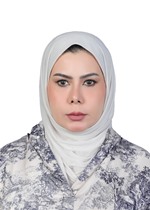
Dr. Abeer Abdullah Al Anazi
Australian University
Kuwait
Abstract Title: Sustainable Water Treatment Using Green Chemistry Approaches and Renewable Energy Integration: A Pathway to Circular Resource Utilization
Biography:
Dr. Abeer Abdullah Al Anazi is an Assistant Professor in the Mechanical Engineering Department at the Australian University, Kuwait. She has over 10 years of teaching and research experience specializing in renewable energy systems, sustainable water treatment, and green technologies. Her recent work focuses on the integration of renewable energy with advanced water treatment technologies, including eco-friendly oxidation methods, nanomaterial applications, and circular economy approaches. Dr. Al Anazi has published in peer-reviewed Q1/Q2 journals and presented at international conferences on sustainable engineering solutions. She has also contributed to applied projects addressing clean energy transitions and climate resilience in the Middle East. With her cross-disciplinary expertise, she advocates for innovative solutions that bridge engineering, green chemistry, and policy to advance global sustainability goals.
Research Interest:
The growing global demand for clean water and sustainable energy requires innovative solutions that minimize environmental impact while maximizing efficiency. This research presents the design and implementation of an integrated water treatment system for tanker-based water distribution, utilizing renewable energy sources and green chemistry approaches. The system incorporates solar-powered aeration, advanced oxidation processes (AOPs), and catalytic nanomaterials synthesized through eco-friendly routes to remove microbial and chemical contaminants. By harnessing renewable energy, the system reduces dependency on fossil-fuel-driven pumping, while green catalysts minimize the formation of harmful by-products typically associated with conventional chemical treatments. Experimental evaluations demonstrated significant improvements in energy efficiency, cost reduction, and pollutant removal rates, highlighting its viability for deployment in resource-constrained environments. This study provides a scalable model for advancing the United Nations’ Sustainable Development Goals (SDGs), particularly clean water (SDG 6), affordable and clean energy (SDG 7), and climate action (SDG 13). The outcomes emphasize the role of interdisciplinary innovations at the nexus of renewable energy and green chemistry in shaping sustainable water and energy futures.
